Iraqi Kurds 'fully control Kirkuk' as army flees
- Published
Paul Wood: "The speed of the jihadis' advance has shocked the Iraqi government and its Western allies"
Iraqi Kurdish forces say they have taken full control of the northern oil city of Kirkuk as the army flees before an Islamist offensive nearby.
"The whole of Kirkuk has fallen into the hands of peshmerga," Kurdish spokesman Jabbar Yawar told Reuters. "No Iraq army remains in Kirkuk now."
Kurdish fighters are seen as a bulwark against Sunni Muslim insurgents.
Meanwhile, Iraq's parliament has postponed a vote on a call by PM Nouri Maliki for a state of emergency.
The fall of Mosul, the country's second city, to the Islamists sent shockwaves across the Middle East.
Kirkuk and the surrounding province of Tamim are at the heart of a political and economic dispute between Iraq's Arabs and Kurds.

Kirkuk dispute
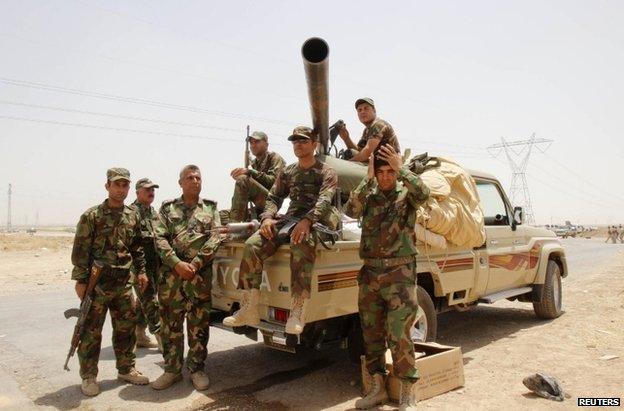
Kurdish fighters outside Kirkuk on Wednesday
•Under Saddam Hussein's programme of "Arabisation", Kurds were driven from Kirkuk and replaced with settlers from the south, and the Iraqi government continues to assert control over nearby oilfields, with the backing from the local Turkmen community
•The Kurdistan Regional Government, which administers three provinces to the north-east, is pushing for Arabisation to be reversed
•In May 2013, Kurdish fighters took up positions on the outskirts of Kirkuk after Iraqi security forces were redeployed to deal with Sunni militants elsewhere
•A census and referendum on the affiliation of the province has been repeatedly delayed by the broader political crisis in Iraq

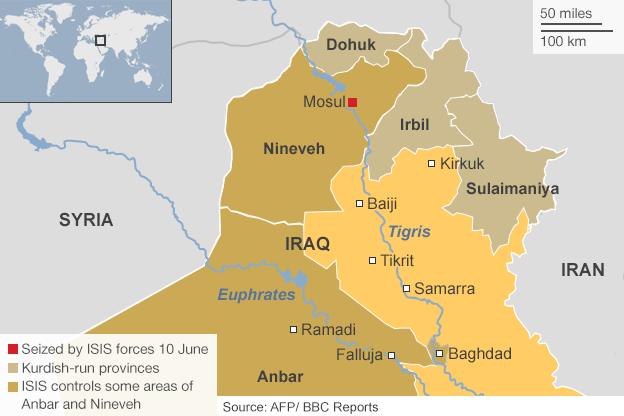
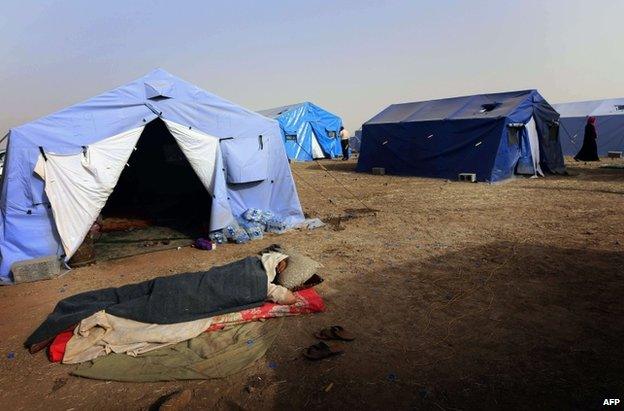
Tents are being prepared for refugees in Iraq's Kurdish province of Irbil
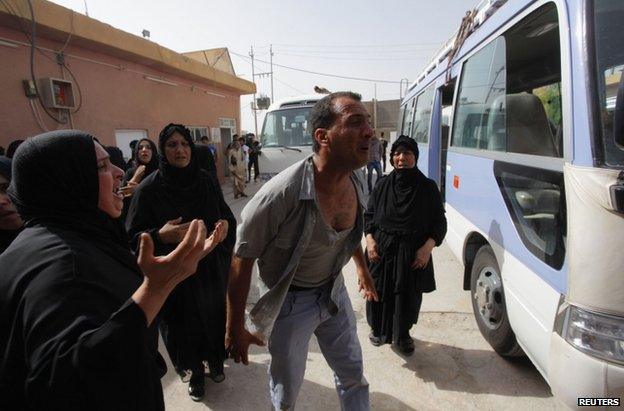
Funerals are being held for victims of a suicide bomber who attacked mourners in Baghdad
Led by the Islamic State in Iraq and the Levant (ISIS), the insurgents are believed to be planning to push further south, to the capital Baghdad and regions dominated by Iraq's Shia Muslim majority, whom they regard as "infidels".
But it appears the insurgents want to avoid tangling with Iraqi Kurds - a more cohesive fighting force - in provinces bordering Nineveh province where Mosul is located, the BBC's Jim Muir reports from Kurdish-run Irbil.
A new insurgent offensive could come from the west, where they control the city of Falluja, 69km (43 miles) from Baghdad, our correspondent adds.
Washington says it is considering further assistance to Iraq in fighting the militants, without giving details.
The UN Security Council has condemned the attacks on Mosul and Tikrit, another town seized by the insurgents. The humanitarian situation around Mosul, where up to 500,000 people have fled, was "dire and... worsening by the moment", it said.

ISIS in Iraq
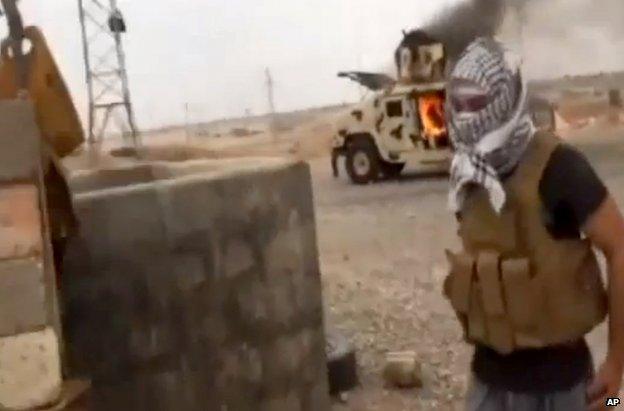
An Islamist fighter near a burning Iraqi army Humvee in Tikrit
The Islamic State in Iraq and the Levant (ISIS) has 3,000 to 5,000 fighters, and grew out of an al-Qaeda-linked organisation in Iraq
ISIS has exploited the standoff between the Iraqi government and the minority Sunni Arab community, which complains that Shia Prime Minister Nouri Maliki is monopolising power
It has already taken over Ramadi and Falluja, but taking over Mosul is a far greater feat than anything the movement has achieved so far
The organisation is led by Abu Bakr al-Baghdadi - an obscure figure regarded as a battlefield commander and tactician. He was once the leader of al-Qaeda in Iraq, one of the groups that later became ISIS.

'Awaiting orders'
Kurdish Brig Gen Shirko Rauf told AFP news agency: "We tightened our control of Kirkuk city and are awaiting orders to move toward the areas that are controlled by [ISIS]."
Iraq's Kurds have long sought to incorporate Kirkuk into their autonomous region in the north.
Parts of Kirkuk province were overrun by the Sunni Islamists this week, and some of the civilians fleeing Mosul and other towns have sought refuge in the Kurdish provinces. Others streamed south along with retreating security forces to Baghdad.
Foreign Secretary William Hague: "Britain won't be getting involved militarily"
The Iraqi prime minister is believed to be asking for powers to impose curfews, restrict public movements and censor the media.
But a session of the parliament in Baghdad to vote on this was postponed after only 128 MPs out of 325 attended.
Government forces slowed the insurgents' advance on Wednesday outside Samarra, a city just 110km (68 miles) north of Baghdad.
However, according to AFP news agency's sources, the militants have since pushed even further south, bypassing Samarra and seizing the town of Dhuluiya, 90km north-west of Baghdad.
The insurgents also control a large swathe of territory in eastern Syria, amid a campaign to set up a Sunni militant enclave straddling the border.
In another development, funerals were being held on Thursday for victims of a suicide bomber who killed at least 15 people and injured 34 when he blew himself up at a funeral in Baghdad on Wednesday.
Are you in the area? Are you from Kirkuk or Mosul? Have you been affected by the situation? You can email haveyoursay@bbc.co.uk, external using 'Mosul' in the subject.